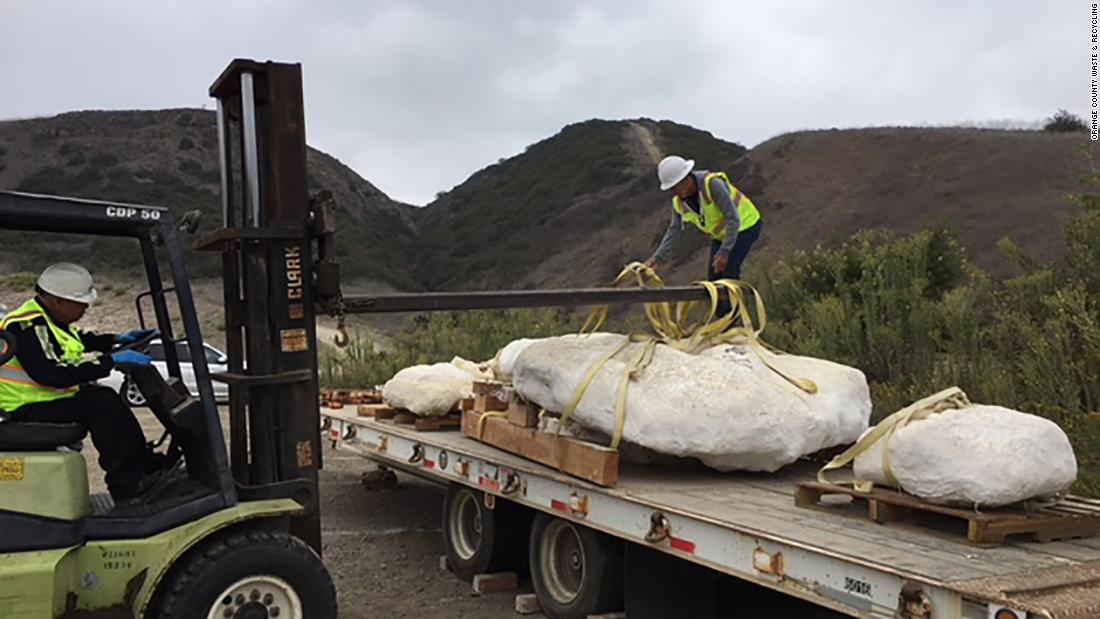Page 9186
Oct 2, 2018
Scientists may have uncovered an entire new whale species
Posted by Genevieve Klien in categories: law, sustainability

(CNN) — Scientists believe a fossil found at a landfill in California belongs to an extinct species of whale that lived between 4 and 7 million years ago.
The seven-ton fossil was unearthed in June during a construction excavation at the Prima Deshecha landfill in San Juan Capistrano, Orange County Waste & Recycling announced in a statement.
Continue reading “Scientists may have uncovered an entire new whale species” »
Oct 2, 2018
Atom Smasher Detects Hints of New Unstable Particle
Posted by Genevieve Klien in category: particle physics
The Large Hadron Collider, a massive particle accelerator near Geneva, Switzerland, just discovered two new baryons and hints of a meson.
Oct 2, 2018
DARPA Is Researching Quantized Inertia, a Theory Many Think Is Pseudoscience
Posted by Genevieve Klien in category: futurism
Oct 2, 2018
Controversial study suggests child abuse may leave a detectable DNA biomarker
Posted by Genevieve Klien in categories: biotech/medical, genetics
The field of epigenetics sits precariously on the precipice of the classic nature versus nurture debate. Instead of a simple environment versus genetics dichotomy, epigenetic examines how specific genes are either switched on or off through external forces encountered in a person’s lifetime. Striking new research from scientists at the University of British Columbia and Harvard University is suggesting that adults who were victims of abuse as children may carry an imprint of that trauma in regions of their DNA.
Oct 2, 2018
CSER Special Issue: ‘Futures of Research in Catastrophic and Existential Risk’
Posted by Alexei Turchin in category: existential risks
The Centre for the Study of Existential Risk’s (CSER) special issue Futures of Research in Catastrophic and Existential Risk was recently published. CSER is an interdisciplinary research centre within the University of Cambridge dedicated to the study and mitigation of risks that could lead to human extinction or civilisational collapse.
The special issue, edited by CSER postdoc Dr Adrian Currie, brings together a wide range of research on existential and catastrophic risk. This research is increasingly multi-disciplinary and broad in scope. It considers how existential risk is conceptualized as well as challenges in communication, responsibility and epistemology. Many of the fifteen papers collected here were originally presented at our first Cambridge Conference on Catastrophic Risk in 2016.
Contents:
Oct 2, 2018
Drone defense — powered by IoT — is now a thing
Posted by Genevieve Klien in category: drones
A new partnership between AT&T and startup Dedrone could bring drone defense to mainstream industry. But do we really need it?
Oct 2, 2018
Movement for Indefinite Life Extension 2018 Drive to Stay Alive Message
Posted by Eric Schulke in categories: aging, bioengineering, ethics, existential risks, futurism, life extension, philosophy, transhumanism
The universe is filled with uncountable amounts of mystery, discovery, opportunity, experiences, marvels and more. So, let’s not die if we don’t have to.
It’s much harder to make the case that radical longevity cannot be engineered into our biology than that it can. Humanity engineers cells in countless ways all the time now, and our knowledge, capability and tools keep growing exponentially.
Now, a mainstream amount of demand to create a bustling global industry of life extension R&D is the only thing standing between you and the ability to live indefinitely.” — Eric Schulke
Fifteen thousand years worth of Netflix are watched every day. Fifteen billion dollars are spent on the Super Bowl and fifteen billion dollars are spent on Valentine’s day. Those aren’t bad things but we need some perspective. Survival is humanity’s main and oldest occupation. We have what it takes to survive if we pay attention and get with the program.
Continue reading “Movement for Indefinite Life Extension 2018 Drive to Stay Alive Message” »
Oct 2, 2018
Helion Energy got funding for possible breakeven fusion device this year
Posted by Bill Kemp in category: energy
Oct 2, 2018
Said ITER would cost $45+ billion more and DOE agrees
Posted by Bill Kemp in categories: energy, futurism
In 2017, Nextbigfuture said that the ITER tokamak fusion project would cost $45–60 billion more than the claimed $22 billion construction budget and US Department of Energy (DOE) agrees with a far higher cost estimate. On April 11, 2018, Paul Dabbar, DOE undersecretary for science, provided a $65 billion estimate to the Senate Appropriations subcommittee on energy and water development. The $65 billion covers construction alone and annual operating costs once experimental operations begin in 2025 aren’t included.
The day after Dabbar’s testimony, the European Union Council of Ministers endorsed ITER’s nearly two-year-old baseline estimate, which covers construction from 2007 to full completion in 2035. Including a 10% contingency to account for overruns, ITER’s cost to EU members is €11.7 billion ($14.5 billion). As host, the EU is paying 46% of ITER’s cost, five times the share of each of the other six partners: China, India, Japan, Russia, South Korea, and the US.
The budget they talk about is 20 billion euros. This does not include the cost of the hardware only the bureaucratic management costs and the costs of assembly. The donated hardware is not included. The budget is only to get ITER to 2035.
Continue reading “Said ITER would cost $45+ billion more and DOE agrees” »















